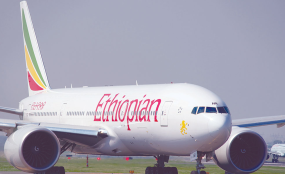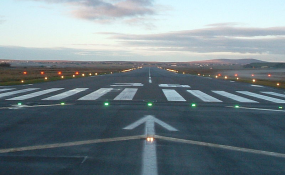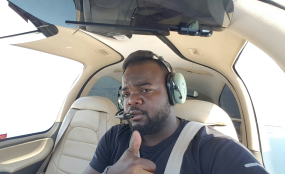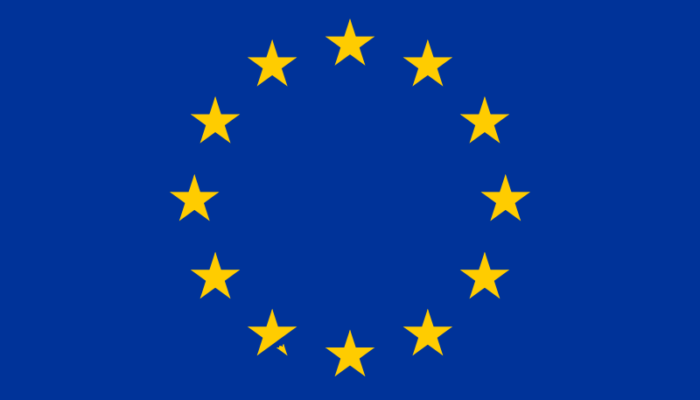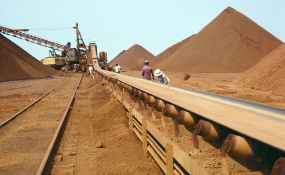Ethiopian Airlines, Africa’s largest cargo and passenger carrier, is dreaming big. After generating revenue of US$2,43 billion in the 2016 financial year, which saw a 70% jump in net profit and an 18% increase in passenger numbers to 7,6 million, the airline says it is buying an additional 55 aircraft, expanding its fleet to 142 planes. Zimbabwe Independent’s assistant editor Brezhnev Malaba (BM) interviewed the Ethiopian Airlines managing director (international services), Esayas Woldemariam (EW), in Victoria Falls at the launch of a direct flight from Addis Ababa. He also spoke about the revival of Air Zimbabwe.
Esayas Woldemariam chats to Transport minister Joram Gumbo in Victoria Falls at the launch of direct flights from Addis Ababa. Pics: Winstone Antonio.
BM: You have been involved in discussions to explore the possibility of reviving Air Zimbabwe. Any progress on that front?
EW: The talks still continue and we are very much focussed on helping in that initiative.
BM: How do you envisage to structure this Air Zimbabwe deal if it were to materialise? We are talking of an airline saddled with debts exceeding US$300 million.
EW: It all depends on the political will of the government of Zimbabwe, and on how they want to put it, whether it is going to be a joint-venture or management consultancy. Ethiopian Airlines is ready for all that.
We have all the human resources, the material resources and the financial resources.
We are looking forward to co-operating with Zimbabwe in a very big way so that we can be able to revamp the whole thing so that Zimbabwe and the rest of Africa are capable of combating the other airlines so that we can defend Africa’s resources and defend the traffic of African airlines.
BM: After studying Air Zimbabwe, what weaknesses have you identified in that struggling airline?
EW: It is just focus which is lacking, otherwise I have been able to learn that Zimbabwe is the most literate African nation, the people in Zimbabwe are very intelligent.
What needs to be done is to tweak that potential and direct it to the right channel so that we can channel it in the right direction. Instead of building 30 000 kilometres of railway from here to Cairo, we build just three to four kilometres of runway and connect people and goods and culture and services. It is cheaper to build and it’s faster to connect. Right now Africa is transacting only 10% internally and 90% with the rest of the world; we want Africans to transact with each other so that employment creation and capital benefit this continent.
BM: It must be a wonderful feeling to know that you are now flying to one of the top tourist destinations in Africa, Victoria Falls, one of the Seven Natural Wonders of the World. How do you feel?
EW: It really feels great because Ethiopian Airlines has always been inspired by the continent and the airline is very African, right down to the bone marrow. Our commercial tagline is “The New Spirit of Africa” and it’s our civic duty to our home continent to promote Africa’s nature, culture, history and wildlife. That’s why we succeeded in building the largest African network in the history of aviation. Ethiopian has been flying in the African skies since 1945.
BM: That’s a long time. What has changed since the old days?
EW: At that time, Ethiopian Airlines was inspired to bring Africa together. At that time, our commercial motto was ‘Bringing Africa Together”. The only way to travel from one part of Africa to another was via Europe, but Ethiopian Airlines came to connect the continent and now we fulfil our civic duty to our home continent. We connect Africa more than any other airline, be it African, American or European. We fly in Africa to 56 destinations. We are operating 87 aircraft.
BM: When are you getting these new planes?
EW: The 55 aircraft have been ordered. Many of them are already getting phased into the fleet. In fact, last month we received additional Airbus A350s, so these will come successively in the next five to seven years.
The 87 aircraft we are operating range from the largest Boeing 777-300, which is a 400 seater and the Dreamliner Boeing 787 and the Airbus A350, the most modern one and the Boeing 737-800, the Sky Interior with next-generation engines.
Our network spans from Tokyo to Los Angeles and just about anywhere in between. The only inhabited continent we do not fly to currently is Australia, but in the next couple of years we are planning to go to Melbourne.
BM: In recent years, we have seen an increase in budget airlines, particularly in Africa, small carriers that charge very low fares. Are they a threat to large airlines like yours?
EW: We are not competing with them; we’re co-operating with them. We want to see more budget airlines and more national carriers in Africa. The more the merrier.
We want to keep the traffic from the Middle East big three (Emirates, Qatar and Etihad) and from the Europeans and from the others, to boast African airlines, because Africans have more to benefit from co-operating than from competing. If tourists from Zimbabwe come to Ethiopia and Ethiopian tourists come to Zimbabwe, job creation, hotels and other related businesses will thrive and capital will remain in Africa and not leave the continent.
BM: You speak of the big three Middle Eastern airlines. How have you remained afloat in the face of such stiff competition?
EW: Number one, we’re African to the core, to the bone marrow. We know Africa better than anyone else. We know what the African customer wants by way of customer service, in-flight and on the ground.
The others cannot compete, this is number one. Number two, what we do is that, with African people going everywhere, we try to conduct good market research on the primary and secondary destinations in Africa. We have a very good vision, a very good strategy about where to go and when to go. We have good corporate governance. All these factors combined enable us to beat the competition.
BM: Ethiopian Airlines has been heavily involved in the establishment of a regional airline for West Africa, ASKY. How has that project gone?
EW: We have been assisting to establish ASKY airline in Lome, Togo, for the West African sub-continent. And also Malawian Airline, in Malawi.
BM: Why is it still extremely difficult to travel from one African country to another without having to fly via Europe first?
EW: We are changing that. Within the continent, without having to go via Europe, you can now travel to many places.
Ethiopian Airlines is committed to the building of an alliance of African aviation so that we can work with each other to serve the African continent.

